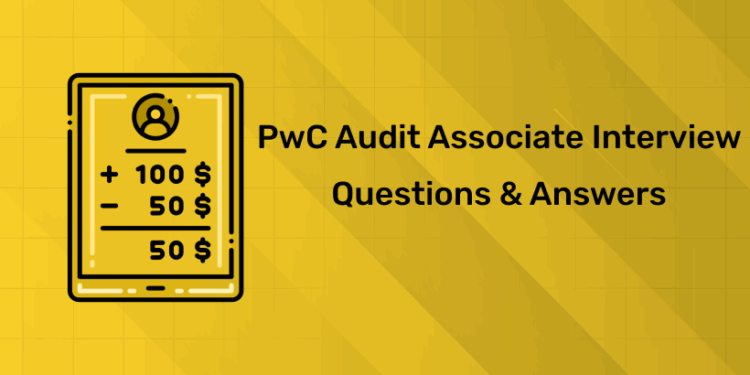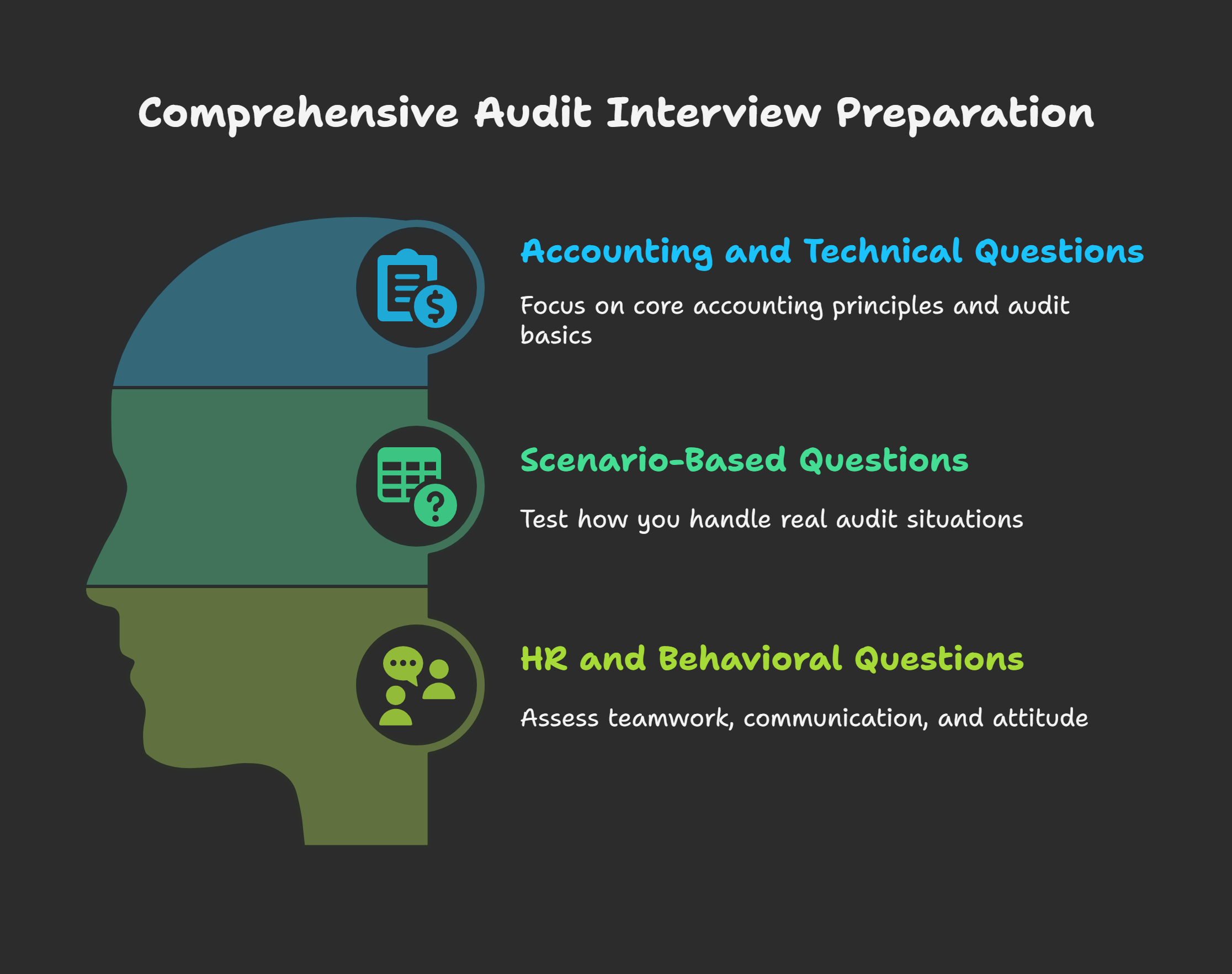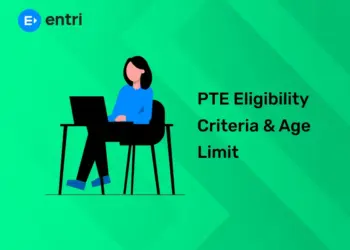Table of Contents
Getting ready for a job at PwC? It’s a great place to begin your career. Many graduates aim to become an audit associate. The role offers learning, growth, and real-world exposure. But to get hired, you must crack the interview. That’s where preparation makes a big difference. PwC Audit Associate Interview Questions often test your basics and thinking. You may also face practical and behavioral questions. Knowing what to expect gives you a clear advantage.
This blog will guide you through every interview round. From accounting concepts to final round tips, it’s covered. You’ll find simple answers to common technical questions. We’ve also added practical scenarios and HR questions. These will help you respond with more confidence. The goal is to make your preparation stress-free. Read each section and take quick notes. Practice answers aloud if needed. Now, let’s explore the questions one by one.
Become an Accounting Pro – Learn from Industry Experts!
PwC Audit Associate Interview Questions: Introduction
Getting a job at PwC is a smart career step. It’s one of the world’s top four accounting firms. Many fresh graduates dream of becoming Audit Associates here. The role offers great learning and career growth. But to get selected, you must clear the interview. The process includes technical, practical, and HR rounds. Each round checks different skills and knowledge areas. With the right approach, you can succeed.
Here’s what you can expect in the PwC interview:
-
Accounting and Technical Questions
-
Focus on core accounting principles and audit basics.
-
Be clear on topics like revenue, trial balance, and materiality.
-
Understanding financial statements and audit procedures is key.
-
-
Scenario-Based Questions
-
Test how you handle real audit situations.
-
You may be asked how to deal with errors or mismatches.
-
These questions show your thinking and decision-making.
-
-
HR and Behavioral Questions
-
Assess your teamwork, communication, and attitude.
-
Expect questions on strengths, goals, and work under pressure.
-
With good preparation, you can confidently crack each stage.
PwC Audit Associate Interview Questions: Accounting Concept Questions and Technical Questions
1: Accounting provides information on
1. What is the difference between accounts receivable and payable?
Accounts receivable is money owed to the business. Accounts payable is money the business owes others. Receivables are assets recorded under current assets. Payables are liabilities under current liabilities on the balance sheet.
2. What is double-entry accounting?
Double-entry means every transaction affects two accounts. One account is debited, and another is credited. This system ensures the accounting equation stays balanced. It improves accuracy and reduces errors in records.
3. Define the matching principle in accounting.
Expenses must match revenues in the same period. This shows true profitability for a given time. It follows the accrual basis of accounting. Helps ensure fair financial reporting and analysis.
4. What is accrual accounting?
Accrual accounting records transactions when they occur. It does not wait for actual cash movement. Revenues and expenses are recorded in the same period. It gives a clearer picture of financial performance.
5. What is a trial balance?
A trial balance lists all ledger account balances. It checks if total debits equal total credits. It helps identify errors in recording transactions. It’s usually prepared at the end of a period.
6. What is the accounting equation?
Assets = Liabilities + Shareholders’ Equity.
This formula is the foundation of balance sheets. It keeps records balanced after every transaction. Every entry affects this equation in some way.
7. What is depreciation?
Depreciation is the reduction in asset value over time. It reflects wear and tear or obsolescence. Common methods include straight-line and written-down value. It spreads the asset cost over its useful life.
8. What are adjusting journal entries?
Adjusting entries are made at period-end. They update revenues and expenses not yet recorded. They ensure accuracy in financial statements. Examples include accrued income or prepaid expenses.
9. What is goodwill in accounting?
Goodwill is an intangible asset from business acquisition. It represents value beyond tangible assets and liabilities. Examples include brand name, reputation, and customer loyalty. Goodwill is shown in the acquiring company’s balance sheet.
10. What is the purpose of auditing?
- Auditing checks accuracy of financial records and systems.
- It detects errors, fraud, and misstatements.
- It builds trust in the company’s financial reports.
- External audits ensure compliance with accounting standards.
11. What is the concept of materiality?
Materiality refers to the importance of financial information. A detail is material if it influences decisions. Small errors may be ignored if not material. Auditors use judgment to set materiality thresholds.
12. What are internal controls in auditing?
Internal controls are systems to prevent fraud or error. They ensure operations follow company policies. Examples include approval processes and access restrictions. Strong controls help reduce audit risk.
13. What is an audit trail?
- An audit trail is a record of transactions.
- It traces each transaction back to its source.
- It supports transparency and accountability in financial reporting.
- Auditors use it to verify accuracy and completeness.
14. What are the types of audit opinions?
There are four main types of audit opinions.
-
Unqualified – financials are presented fairly.
-
Qualified – except for a few issues.
-
Adverse – financials are misleading.
-
Disclaimer – auditor can’t give an opinion.
15. What is vouching in auditing?
Vouching checks supporting documents for recorded transactions. It confirms authenticity and accuracy of entries. Examples: checking invoices, receipts, or payment vouchers. It helps detect fraud or unrecorded liabilities.
Placement Oriented PWC Business Accounting Course
PWC Certified Business Accounting Course by Entri App: Master in-demand skills, ace interviews, and secure top-tier jobs.
Join Now!PwC Audit Associate Interview Questions: Scenario-Based / Practical Questions
1. How would you audit cash transactions?
-
Check cash book and bank statements.
-
Match balances with the ledger.
-
Verify large or unusual transactions.
-
Look for missing or duplicate entries.
-
Perform surprise cash counts, if possible.
2. What would you do if a client is uncooperative?
-
Stay calm and remain professional.
-
Explain the audit requirements clearly.
-
Document all communication and responses.
-
Escalate the issue to your manager.
-
Seek help to get required documents.
3. How do you verify inventory?
-
Observe physical stock count process.
-
Compare physical count with inventory records.
-
Check supporting purchase and sales invoices.
-
Review inventory aging reports.
-
Look for obsolete or slow-moving stock.
4. What steps would you take to audit revenue?
-
Understand client’s revenue recognition policy.
-
Match invoices with delivery records.
-
Verify customer payments and receipts.
-
Test for cut-off errors.
-
Look for unusual or irregular sales.
5. What would you do if expenses seem overstated?
-
Review vouchers and receipts carefully.
-
Compare expenses with industry benchmarks.
-
Look for repeated or split payments.
-
Discuss concerns with your senior.
-
Recommend further investigation if needed.
6. How do you check for fraud in payments?
-
Look for duplicate or fake invoices.
-
Verify vendor authenticity and payment approvals.
-
Review changes in payment patterns.
-
Trace payments to bank statements.
-
Report suspicious activity to seniors.
7. What would you do if you found an error?
-
Note down the exact issue.
-
Trace it back to source documents.
-
Check if it’s material or minor.
-
Inform your senior or manager.
-
Recommend correction or further review.
8. How do you handle pressure during audit season?
-
Prioritize tasks and follow a checklist.
-
Communicate clearly with the team.
-
Take short breaks to stay focused.
-
Avoid multitasking when accuracy matters.
-
Stay calm and ask for help.
9. How would you audit fixed assets?
-
Verify asset register and physical assets.
-
Check purchase invoices and approvals.
-
Review depreciation calculations.
-
Ensure assets are in use.
-
Check for asset disposals or transfers.
10. What would you do if the trial balance doesn’t match?
-
Recheck all debit and credit entries.
-
Identify accounts with mismatched totals.
-
Look for entry errors or omissions.
-
Recalculate totals using software or manually.
-
Inform your senior if issue persists.
11. How do you test controls over purchases?
-
Understand the purchase approval process.
-
Check for segregation of duties.
-
Review supporting documents and authorizations.
-
Match orders with invoices and payments.
-
Test a sample for control effectiveness.
12. What will you do if cut-off errors are found?
-
Identify affected transactions near period end.
-
Adjust entries to correct the period.
-
Review invoices and delivery dates.
-
Update financials with correct cut-off.
-
Report it in the audit file.
13. How do you perform a bank reconciliation audit?
-
Collect bank statements and cash books.
-
Match opening and closing balances.
-
Verify outstanding cheques and deposits.
-
Investigate any unexplained differences.
-
Ensure reconciliation is timely and accurate.
14. How do you test payroll transactions?
-
Check employee master and payroll sheets.
-
Verify gross pay, deductions, and net pay.
-
Match salary payments with bank statements.
-
Review attendance or work records.
-
Ensure proper approvals for salary changes.
15. How do you audit accounts receivable?
-
Review aging reports and outstanding balances.
-
Send confirmation requests to selected customers.
-
Check invoices and collection records.
-
Identify overdue or doubtful debts.
-
Assess adequacy of bad debt provisions.
Become an Accounting Pro – Learn from Industry Experts!
PwC Audit Associate Interview Questions: HR & Behavioral Round Questions
Note: The answers to HR and behavioral questions can vary. Your responses should reflect your real experiences and personality. The sample answers below are just for reference. Use them as a guide to structure your own honest and simple responses.
1. Tell me about yourself.
I am a commerce graduate with strong accounting skills. I enjoy learning and solving finance-related problems. During college, I completed an internship in auditing. I like working in teams and meeting deadlines. Now, I would like to begin my career at PwC.
2. Why do you want to join PwC?
PwC is a respected global accounting firm. It offers learning, growth, and real industry exposure. The audit role matches my skills and interests. I want to learn from the best professionals. I see PwC as my long-term career path.
3. What are your strengths?
- I am hardworking, organized, and detail-oriented.
- I stay calm during pressure and tight deadlines.
- I communicate well and enjoy teamwork.
- I always complete tasks on time.
- I am quick to learn new things.
4. What is your biggest weakness?
Sometimes I overthink simple tasks too much. It slows me down in decision-making moments. But I’m working on trusting my judgment more. I now set time limits for each task. This helps me stay efficient and confident.
5. How do you handle deadlines?
I break large tasks into smaller parts. I prioritize based on urgency and importance. I create a checklist and track progress daily. If needed, I work extra hours to finish. I believe in planning early, not last-minute rushing.
6. Describe a time you worked in a team.
In college, I worked on a finance project. We had to analyze a company’s financials together. I divided tasks based on each person’s strength. We met daily to track our progress. The project was submitted early and scored well.
7. How do you handle feedback or criticism?
I see feedback as a chance to improve. I listen calmly and note all points. I don’t take it personally or feel hurt. I reflect and apply the suggestions seriously. Feedback helps me grow and avoid future mistakes.
8. Tell me about a challenge you overcame.
I once struggled to understand a new audit process. It felt confusing and time-consuming at first. I asked a senior for guidance and tips. I practiced the process on dummy data. Within days, I became confident and efficient.
9. What motivates you at work?
I feel motivated when I learn something new. Finishing tasks correctly also gives me satisfaction. Positive feedback and teamwork boost my energy.
Knowing I’m improving keeps me focused. Challenges push me to work even harder.
10. How do you prioritize tasks?
I list all tasks at the start. Then I mark urgent and important ones first. I use reminders to avoid missing deadlines. I handle similar tasks together to save time. This keeps my day organized and stress-free.
11. Where do you see yourself in 5 years?
I see myself as a senior audit associate. I hope to lead small teams by then. I also plan to complete CA or CPA. I want to grow and stay with PwC. I aim to become a trusted audit professional.
12. How do you deal with conflict in a team?
Here are some few steps that I take to deal with conflict in a team:
- I stay calm and listen to both sides.
- I try to understand the root cause.
- I speak politely to solve misunderstandings.
- If needed, I involve a neutral person.
- I focus on solutions, not blame.
13. What does work-life balance mean to you?
It means managing work without ignoring personal life. I believe in working smart, not just hard. Breaks help me stay fresh and focused. Weekends are for family and rest. A healthy balance keeps me productive.
14. Describe your ideal work environment.
I like a calm, focused, and respectful workplace. Team support and good communication matter to me. Clear goals help me stay motivated daily. I enjoy a space where learning never stops. Honest feedback and support are also important.
15. Do you have any questions for us?
Yes, I’d like to know about PwC’s training programs. How does PwC support new joiners in audit roles? What growth path can I expect in this role? Also, how is teamwork managed during peak periods? I’m excited to learn and grow at PwC.
Become an Accounting Pro – Learn from Industry Experts!
PwC Audit Associate Interview Questions: Final Round (Partner/Managerial Questions)
Note: The answers provided are example responses only. Your actual answers should reflect personal experiences. Use these samples as a reference guide.
1. Where do you see yourself in five years?
In five years, I will be a senior audit lead. I will have completed my CA qualification successfully. I hope to mentor junior audit team members. I plan to drive continuous improvements in processes.
2. How do you add value to our firm?
My analytical skills uncover key audit insights. I quickly adopt new audit technologies and methods. Clear communication keeps stakeholders informed and aligned. I propose practical solutions that reduce client risks.
3. What makes PwC different from other firms?
PwC’s global network offers unique client exposure. The firm invests heavily in staff development programs. Innovation and technology adoption drive audit excellence. Its culture emphasizes integrity, collaboration, and respect.
4. Describe a difficult audit you managed.
I once audited a client with weak controls. We discovered significant inventory reconciliation discrepancies early. I proposed stronger procedures to management immediately. The client implemented changes and reduced future risks.
5. How did you resolve a team conflict?
I listened closely to each team member’s view. I facilitated an open, respectful group discussion. We agreed on clear roles and responsibilities. This restored harmony and improved our productivity.
6. What is your leadership style?
- I lead by supporting and empowering my team.
- I set clear goals and share expectations.
- I encourage open feedback and collaborative problem solving.
- I celebrate successes and address issues swiftly.
7. How do you ensure quality in work?
- I follow audit procedures and checklists thoroughly.
- I double-check calculations and review supporting documents.
- Peer reviews add extra assurance and fresh perspective.
- I refine processes based on past lessons learned.
8. Tell us about a time you mentored someone.
I guided an intern through our audit software. We reviewed their work together each morning. I provided clear advice and hands-on feedback. They improved quickly and gained strong confidence.
9. How do you handle ethical dilemmas?
- I review firm policies and professional standards carefully.
- I discuss concerns discreetly with a trusted mentor.
- I choose integrity over convenience every single time.
- I document decisions thoroughly for transparency and audit.
10. What strategic changes would you suggest?
I would enhance data analytics across audit tasks. Automating routine tests would free time for analysis. Client training sessions could strengthen internal controls. Early pilots of new audit tools drive innovation.
11. How do you manage client relationships?
- I set clear expectations at engagement kickoff meetings.
- I listen attentively to client concerns and goals.
- I deliver timely, accurate updates and reports.
- Proactive solutions foster trust and strong partnerships.
12.Describe how you set and achieve goals.
- I define clear, measurable, time-bound objectives first.
- I break goals into manageable daily tasks.
- I track progress diligently using simple checklists.
- Celebrating milestones keeps motivation and focus high.
13. How do you stay updated with industry trends?
- I read PwC thought leadership and industry reports.
- I attend relevant webinars and professional workshops.
- I follow accounting standard changes closely every month.
- Discussing ideas with colleagues broadens my perspective.
14. What do you expect from this role?
- I expect mentorship from experienced audit leaders.
- I look forward to challenging, varied audit projects.
- I value clear, constructive feedback on performance.
- I seek continuous learning and skill development opportunities.
15. Do you have any questions for us?
- Yes, how is partner support structured here?
- What metrics define success in this position?
- Which career paths follow the associate role?
- How quickly does PwC adopt audit innovations?
Placement Oriented PWC Business Accounting Course
PWC Certified Business Accounting Course by Entri App: Master in-demand skills, ace interviews, and secure top-tier jobs.
Join Now!PwC Audit Associate Interview Questions: Conclusion
Preparing thoroughly increases confidence for PwC interviews. Reviewing accounting fundamentals ensures you understand core topics. Practicing scenario questions refines your real-world problem skills. Sharing honest experiences makes responses stand out. Researching PwC’s culture tailors your answers effectively. Mock interviews simulate real conditions and build preparedness.
Plan your study schedule and stick to deadlines. Use past audit projects as illustrative examples. Prepare thoughtful questions to ask your interviewers. Network with current PwC associates for insider insights. Stay calm, confident, and embrace continuous improvement.
Placement Oriented PWC Business Accounting Course
PWC Certified Business Accounting Course by Entri App: Master in-demand skills, ace interviews, and secure top-tier jobs.
Join Now!Frequently Asked Questions
What is the PwC Audit Associate selection process?
The process includes technical, scenario, HR, and partner rounds.
How long does the interview process take?
It usually spans two to four weeks total.
What technical topics should I focus on?
Focus on accounting principles, audit procedures, and materiality.
How can I prepare scenario-based questions?
Practice real audit examples and explain your decision steps.
What behavioral traits does PwC look for?
They seek integrity, teamwork, adaptability, and strong communication.
What documents should I bring to the interview?
Bring your resume, academic transcripts, and internship certificates.
How should I dress for the interview?
Wear formal business attire and maintain a professional look.
What questions should I ask at the end?
Ask about training, growth paths, and team structures.
How do I follow up after the interview?
Send a thank-you email within 24 hours of interviewing.
What is the best way to handle stress?
Practice mock interviews and use relaxation techniques daily.













